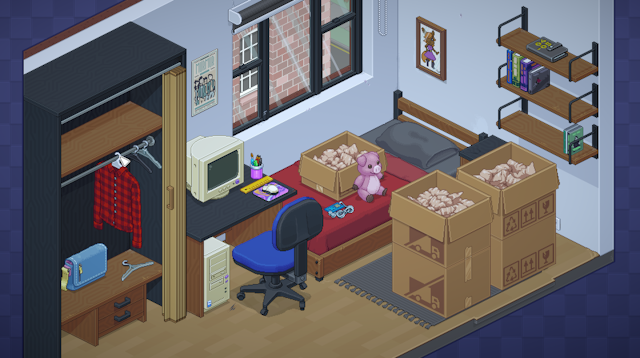After an exhausting day, housework is often the last thing I feel like doing. But I sometimes relax by playing video games where you tidy and arrange household items in living rooms, kitchens and bathrooms.
In a game, domestic tasks can be exciting. Like the indie success Untitled Goose Game and the blockbuster series The Sims, the games I’m thinking of position the completion of mundane tasks as entertainment and art.
Here are four inventive Australian video games where players perform household tasks that, in real life, are often repetitive or unpleasant. But in games these activities can be entertaining and relaxing.
Moving Out
In Moving Out (and its sequel, Moving Out 2), you’re a removalist with a time limit to move objects like fridges, beds and sofas out of homes. Created by Australian and Swedish studios, Moving Out also involves the team that made the cooking game, Overcooked.
In Moving Out, removal is an athletic activity. Floor plans and yards are like obstacle courses with animals, swimming pools and even ghosts.
Players shift furniture in haunted houses and on space stations. Each new setting brings a sense of the unreal to what, in real life, would be a pretty dull task: moving stuff from A to B.
Video games allow us to do things that are unacceptable in real life. In Moving Out, players save time by breaking windows and throwing objects instead of using stairs. We’re invited to embrace the pleasures of recklessness.
In a world obsessed with buying homes and ever more things to fill them, Moving Out offers property destruction as a cathartic alternative.
Unpacking
In Unpacking – which describes itself as a “zen puzzle game” – you learn about someone’s life from youth to adulthood by sorting their possessions through a series of removals.
Doing banal tasks in a game can take us out of our own lives to explore other people’s lives and unexpected environments.
Unpacking allows us to sort the unseen occupant’s possessions, but their life remains a mystery. The game’s pixel art makes their book covers and journal entries tantalisingly unreadable.
Florence
In Florence, you have limited storage space for objects like kitchen utensils, clothing and books. The lead designer of this game also created the enormously popular puzzle game Monument Valley.
When Florence’s partner moves in, you learn about their differences while finding space to store their possessions.
Like Unpacking, Florence allows us to do familiar, domestic tasks in an unfamiliar setting; the player organises characters’ possessions but has no knowledge of the words the couple exchange in blank speech bubbles.
Games set in homes have been linked to materialistic consumer culture; this is a concern some have raised about The Sims. But not all games link buying with happiness.
Florence (like Unpacking) involves organising people’s used possessions, not new goods.
Rumu
In an earlier Australian game, Rumu, you’re a robot vacuum cleaner who cleans up food and drink spills and tidies clothing while you investigate the disappearance of the house’s owners.
This vacuum cleaner is not only an appliance but part of a futuristic home where the artificial intelligence home assistant has emotional problems.
The house in Rumu is like a maze; full of gadgets and secrets, this setting is designed like a puzzle that players must solve to navigate from one place to another. The home is full of advanced “smart” appliances but is abandoned, dysfunctional and alienating. Again, the surreal is mixed with the everyday.
Why are we drawn to games involving mundane tasks?
These examples are not brand new games, but reflect the growth in popularity of everyday settings in games where you can do banal tasks as entertainment.
Such games invite us to relate differently to everyday settings and work. They can confirm French philosopher and sociologist Henri Lefebvre’s view that the everyday can be surreal, extraordinary, surprising and magical. In these games, everyday tasks involve encounters with robots, aliens and the supernatural.
Women spend more time on unpaid work than men. But with women making up almost half of video game players in Australia, these games also cleverly allow us to challenge norms around gender, work and domesticity. For example, players may be able to choose from avatars of various genders and species or control a character with both masculine and feminine traits.
Games link domestic labour to fantasy and adventure, challenging us to imagine everyday life and ordinary places as extraordinary.

